 34 citations,
June 2014 in “The BMJ”
34 citations,
June 2014 in “The BMJ” Pregnancy can change skin disease severity, with some conditions improving and others worsening, and treatment should balance benefits and fetal safety.
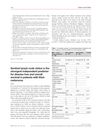 1 citations,
December 2012 in “Journal of the European Academy of Dermatology and Venereology”
1 citations,
December 2012 in “Journal of the European Academy of Dermatology and Venereology” The health of the sentinel lymph node is the best indicator of survival for patients with thick skin cancer.
 July 2023 in “Journal of skin and stem cell”
July 2023 in “Journal of skin and stem cell” Interferon beta treatment in MS patients can cause skin reactions and increased hair loss.
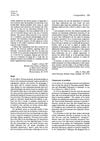 January 1989 in “Journal of The American Academy of Dermatology”
January 1989 in “Journal of The American Academy of Dermatology” Dr. Jorizzo questions the long-term benefits of minoxidil and tretinoin, while Dr. Olsen defends their effectiveness and stresses the need for public education on these treatments.
July 2021 in “Authorea (Authorea)” Graham-Little Piccardi Lassueur Syndrome is a rare skin condition with specific hair loss and skin symptoms.
2 citations,
March 2017 in “JAAD case reports” Oral alitretinoin can quickly regrow hair in alopecia universalis.
33 citations,
June 2021 in “Dermatologic Therapy” COVID-19 vaccines can trigger autoimmune flares but are still beneficial for patients with autoimmune conditions.
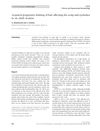 6 citations,
December 2011 in “Clinical and Experimental Dermatology”
6 citations,
December 2011 in “Clinical and Experimental Dermatology” A woman developed rare, unexplained curly hair on her scalp and eyelashes.
 41 citations,
December 2008 in “Journal of the American Academy of Dermatology”
41 citations,
December 2008 in “Journal of the American Academy of Dermatology” Oral valganciclovir improved a patient's skin condition caused by immunosuppression.
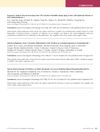 1 citations,
September 2012 in “Journal of Investigative Dermatology”
1 citations,
September 2012 in “Journal of Investigative Dermatology” Aging reduces stem cell activation, leading to hair loss in mice lacking a specific enzyme.
 September 2024 in “Journal of Cosmetic Dermatology”
September 2024 in “Journal of Cosmetic Dermatology” Combining CGF and microneedling with betamethasone effectively treats resistant alopecia areata.
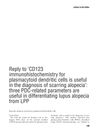 4 citations,
November 2016 in “Journal of Cutaneous Pathology”
4 citations,
November 2016 in “Journal of Cutaneous Pathology” Three characteristics of plasmacytoid dendritic cells help tell apart lupus-related hair loss from LPP.
 41 citations,
December 2015 in “JAMA Dermatology”
41 citations,
December 2015 in “JAMA Dermatology” Tofacitinib citrate improved nail dystrophy and pain in patients with alopecia universalis without causing side effects.
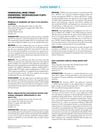 August 2004 in “Journal of the American College of Surgeons”
August 2004 in “Journal of the American College of Surgeons” Several genes, including Hox-7A, Stra6, and Lim-1, are involved in normal palate formation.
 19 citations,
October 2008 in “Journal der Deutschen Dermatologischen Gesellschaft”
19 citations,
October 2008 in “Journal der Deutschen Dermatologischen Gesellschaft” Anti-cancer treatments can cause reversible hair loss, skin sensitivity, pigmentation changes, nail damage, and skin reactions, with a need for more research on managing these side effects.
 6 citations,
October 2017
6 citations,
October 2017 Indian Gooseberry has potential for cancer prevention and treatment and promotes hair growth.
 24 citations,
January 2008 in “KARGER eBooks”
24 citations,
January 2008 in “KARGER eBooks” The document concludes that ongoing research using animal models is crucial for better understanding and treating Alopecia Areata.
 13 citations,
July 1996 in “Annals of Internal Medicine”
13 citations,
July 1996 in “Annals of Internal Medicine” International medical graduates outperformed U.S. graduates on an internal medicine exam.
 144 citations,
September 2006 in “Clinics in Dermatology”
144 citations,
September 2006 in “Clinics in Dermatology” Lupus affects the body and skin, causing joint pain and skin issues that can be treated with steroids and antimalarial drugs.
 12 citations,
May 2003 in “Journal of dermatological science”
12 citations,
May 2003 in “Journal of dermatological science” Hsc70 protein may influence hair growth by responding to androgens.
 139 citations,
February 2014 in “Journal of Advanced Research”
139 citations,
February 2014 in “Journal of Advanced Research” Vitamin D is important for skin health and may affect conditions like psoriasis and hair loss, but more research is needed to understand its role fully.
 38 citations,
April 2016 in “Experimental Dermatology”
38 citations,
April 2016 in “Experimental Dermatology” The document concludes that understanding hair follicle cell cycles is crucial for hair growth and alopecia research, and recommends specific techniques and future research directions.
 194 citations,
March 2003 in “American Journal of Pathology”
194 citations,
March 2003 in “American Journal of Pathology” Stress stops hair growth in mice by causing early hair growth phase end and harmful inflammation through a specific nerve-related pathway.
3 citations,
March 2023 in “International journal of molecular sciences” Keratin protein production in cells is controlled by a complex system that changes with cell type, health, and conditions like injury or cancer.
 47 citations,
July 2004 in “Journal of Dermatological Science”
47 citations,
July 2004 in “Journal of Dermatological Science” Hair loss in balding individuals is linked to changes in specific hair growth-related genes.
 2 citations,
July 1998 in “Dermatologic Clinics”
2 citations,
July 1998 in “Dermatologic Clinics” European dermatologic treatments focus on lifestyle and psychosocial factors, use diverse methods like baths and climate therapy, and emphasize the importance of diet and supplements for skin health.
 13 citations,
October 2017 in “Bioscience, Biotechnology, and Biochemistry”
13 citations,
October 2017 in “Bioscience, Biotechnology, and Biochemistry” Centella asiatica extract may help promote hair growth by blocking a specific cell signaling pathway.
 12 citations,
June 2019 in “Actas dermo-sifiliográficas/Actas dermo-sifiliográficas”
12 citations,
June 2019 in “Actas dermo-sifiliográficas/Actas dermo-sifiliográficas” Proper skin toxicity management in chemotherapy is key to continuing treatment and keeping patient quality of life high.
 5 citations,
September 2022 in “Research Square (Research Square)”
5 citations,
September 2022 in “Research Square (Research Square)” CD201+ fascia progenitors are essential for wound healing and could be targeted for treating skin conditions.
 1 citations,
November 1994 in “JAMA”
1 citations,
November 1994 in “JAMA” The document praises a resource on hair growth disorders and recognizes a reference on blood diseases' molecular aspects as authoritative.


























